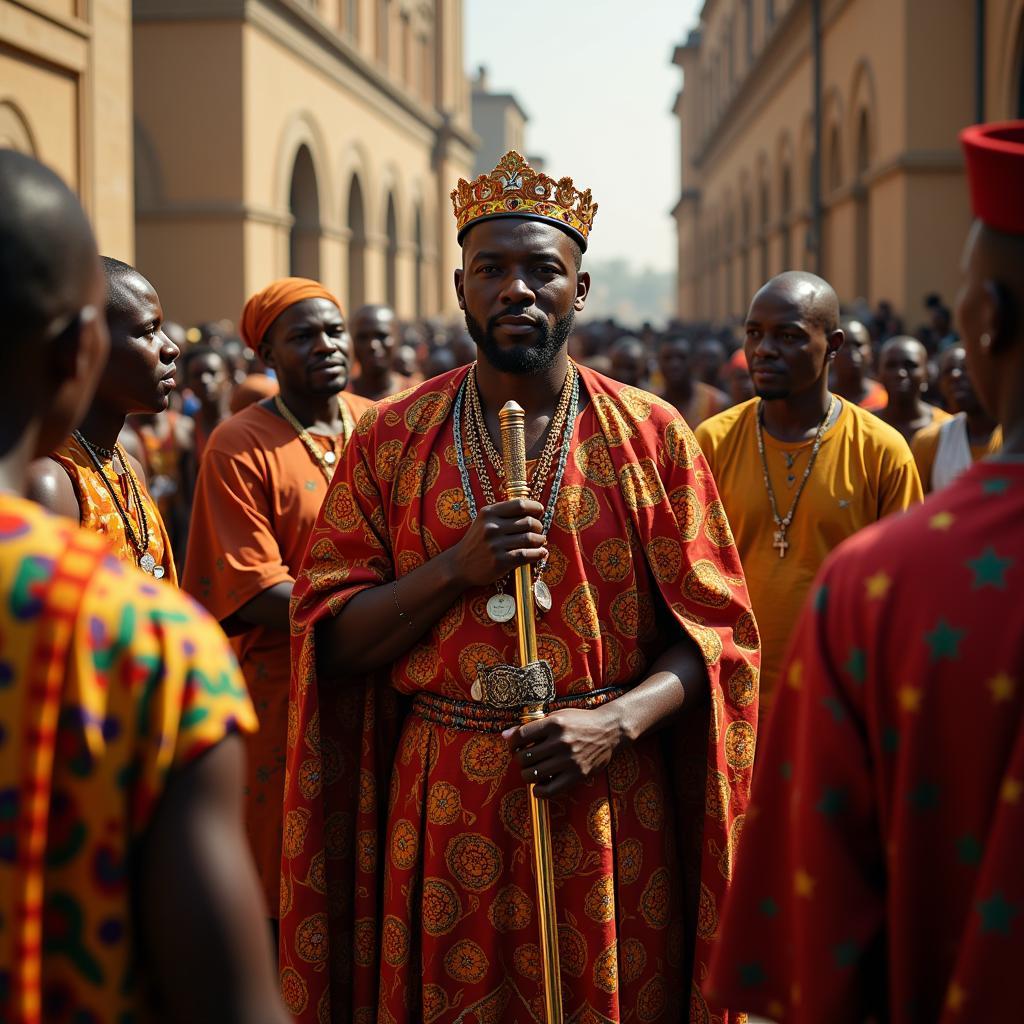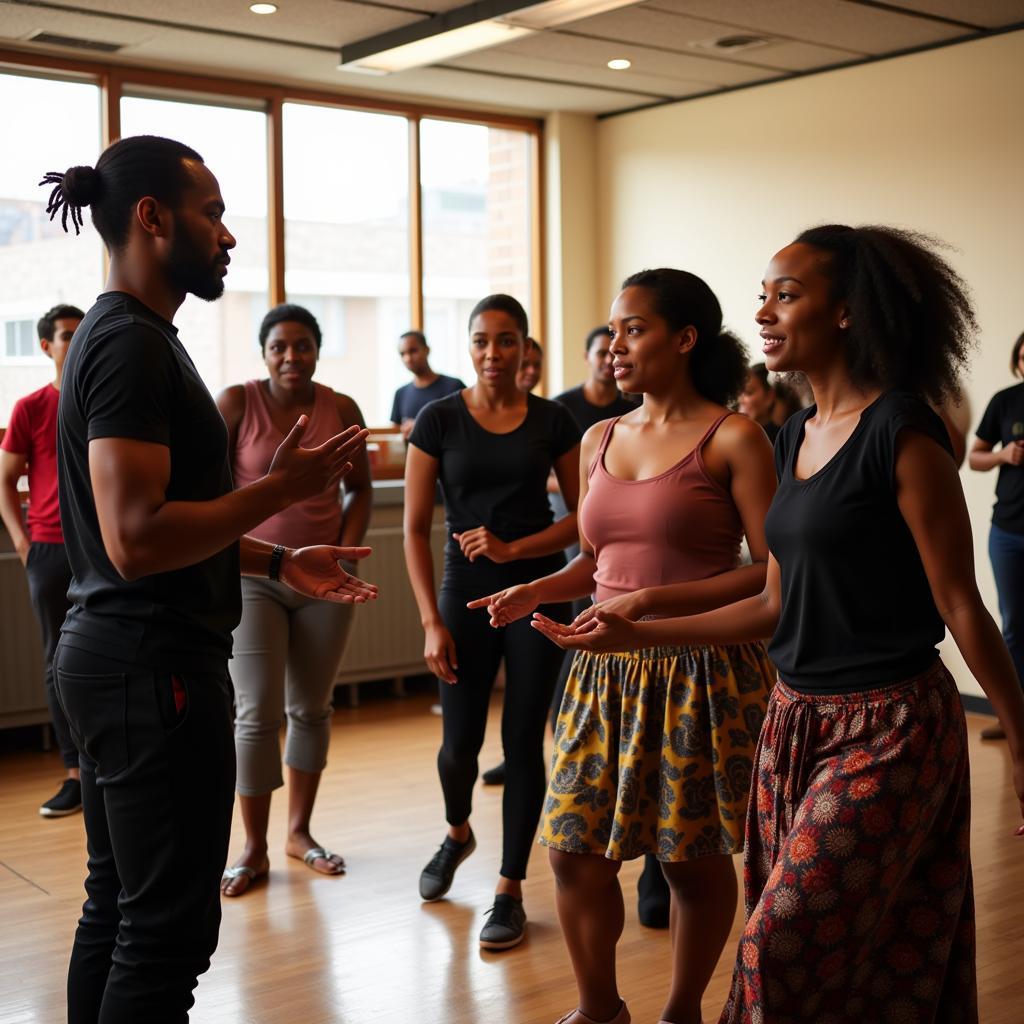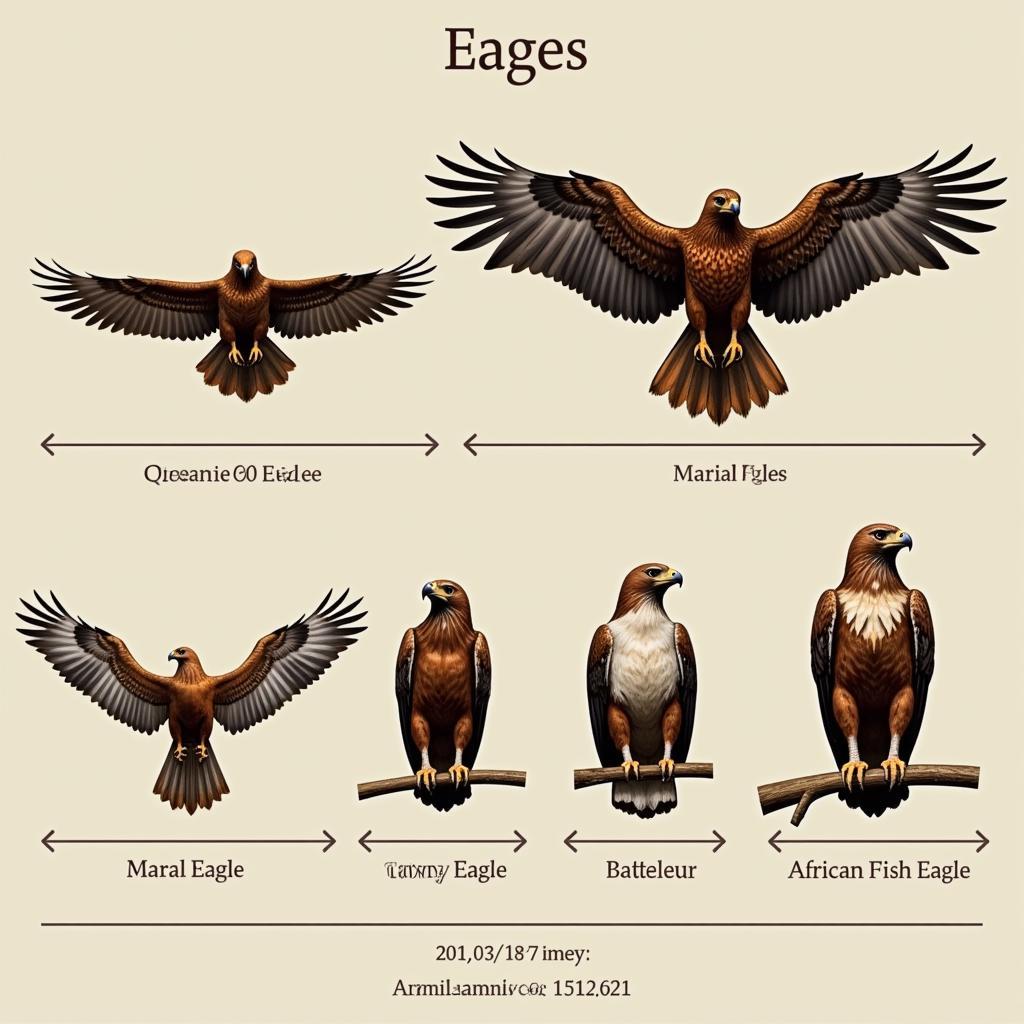Unveiling the Legacy: The Powerful Symbol of the African King
The term “African King” often evokes images of majestic rulers adorned in gold and draped in luxurious fabrics. While this imagery holds some truth, it barely scratches the surface of the deep and complex history surrounding this title. Across the vast expanse of the African continent, the concept of kingship has manifested in diverse and fascinating ways, shaping the social, political, and spiritual landscapes of countless societies.
More Than a Crown: Understanding the Role of an African King
 African King in a Traditional Ceremony
African King in a Traditional Ceremony
To comprehend the true weight of being an “African king,” one must move beyond the simplistic notion of a monarch ruling solely by power and inheritance. While heredity often played a crucial role, an African king’s legitimacy stemmed from a deeper connection to his people and a mandate to serve as custodian of their well-being. He wasn’t just a political leader, but a spiritual figurehead, a symbol of unity, prosperity, and cultural continuity.
For many cultures, the king embodied divine right, acting as an intermediary between the human and the spiritual realms. He was responsible for maintaining balance, ensuring the prosperity of the land, and protecting his people from both physical and spiritual threats. This profound connection to the spiritual world often manifested in elaborate rituals, ceremonies, and regalia that underscored the king’s sacred status.
Diverse Kingdoms, Diverse Kings: A Glimpse into African Kingship
From the powerful empires of West Africa, such as the Ashanti, Mali, and Songhai, to the sophisticated kingdoms of East Africa, like Ethiopia and Buganda, the African continent witnessed the rise of numerous kingdoms, each with its own unique approach to kingship.
The african king cobra, known for its majestic presence, serves as a powerful metaphor for the authority and respect commanded by many African kings. These rulers often held vast territories, commanded formidable armies, and fostered extensive trade networks. They were patrons of the arts, architecture, and scholarship, leaving behind legacies that continue to inspire awe and wonder.
The Kingdom of Benin, for instance, was renowned for its exquisite bronze sculptures, while the Great Zimbabwe ruins stand testament to the architectural prowess of the Shona people. The influence of these powerful kings extended far beyond their borders, shaping the course of history through diplomacy, trade, and cultural exchange.
However, it’s crucial to acknowledge that not all kings were benevolent rulers. The transatlantic slave trade, a dark chapter in human history, saw some african kings sold slaves to European traders, contributing to one of the greatest human tragedies. This complex and often morally ambiguous aspect of history serves as a reminder that the legacy of African kingship, like any historical narrative, is a tapestry woven with both light and shadow.
The Enduring Legacy: African Kings in the Modern Era
The advent of colonialism significantly altered the political landscape of Africa, dismantling many traditional systems of governance. However, the concept of kingship, while evolving, didn’t entirely disappear. In many parts of the continent, traditional rulers still hold positions of authority, albeit often with diminished political power.
Today, many African kings and chiefs serve as custodians of their people’s culture and traditions, playing vital roles in conflict resolution, community development, and promoting peace and unity. They act as bridges between the past and the present, navigating the complexities of modern governance while upholding the values and customs that have shaped their societies for generations.
The significance of traditional rulers in contemporary Africa is particularly evident in countries like Ghana, Nigeria, and South Africa, where they continue to hold significant influence within their communities. They are consulted on matters of development, land ownership, and traditional law, playing a crucial role in bridging the gap between modern governance and traditional practices.
Frequently Asked Questions about African Kings
-
What is the significance of the crown in African kingship? The crown often represents the king’s authority, power, and connection to the divine. However, the specific symbolism can vary significantly depending on the culture and region.
-
Were all African kings men? While the vast majority of rulers were men, there have been notable exceptions, with powerful female monarchs like Queen Amina of Zaria and Queen Nzinga of Ndongo and Matamba challenging traditional gender roles.
-
Do African kings still exist today? Yes, although their roles have evolved. Many traditional rulers continue to hold positions of authority, particularly in matters of culture, tradition, and community affairs.
-
What are some of the challenges facing traditional rulers in modern Africa? Balancing traditional values with modern governance, navigating land disputes, and maintaining relevance in a rapidly changing world are some of the challenges faced by many traditional leaders today.
-
What is the future of African kingship? While predicting the future is difficult, the enduring respect and influence of many traditional rulers suggest that they will continue to play a vital role in their communities, adapting to the changing times while preserving the cultural heritage they represent.
Delve Deeper into the Rich Tapestry of African Culture
Want to learn more about the captivating world of African kings and the vibrant tapestry of the continent’s history? Explore these fascinating reads:
- African Kings 2018: This article provides a glimpse into the contemporary lives and roles of several African monarchs.
- African Kingfisher Vessel: Discover the intriguing connection between a traditional fishing vessel and the symbolism of the kingfisher in certain African cultures.
- African Kings Plants Long Dick White Women: This article delves into a controversial topic, highlighting the complexities and nuances of history while encouraging critical analysis.
The world of African kings is a captivating blend of history, tradition, and cultural evolution. From powerful emperors who shaped empires to the modern-day custodians of their people’s heritage, the legacy of the “African king” continues to fascinate and inspire. It is a story that transcends simplistic narratives, reminding us of the diversity, resilience, and enduring spirit of the African continent.
For any inquiries or assistance, feel free to reach out to us at:
Phone Number: +255768904061
Email: kaka.mag@gmail.com
Address: Mbarali DC Mawindi, Kangaga, Tanzania.
Our dedicated customer support team is available 24/7 to help you.



